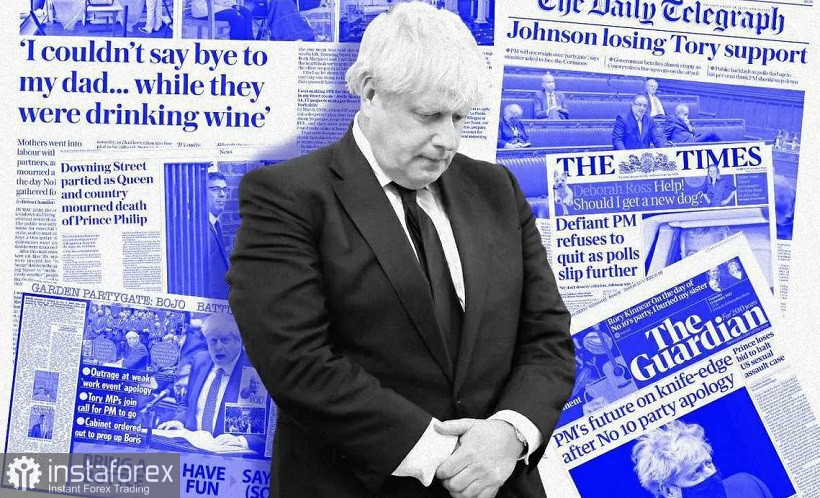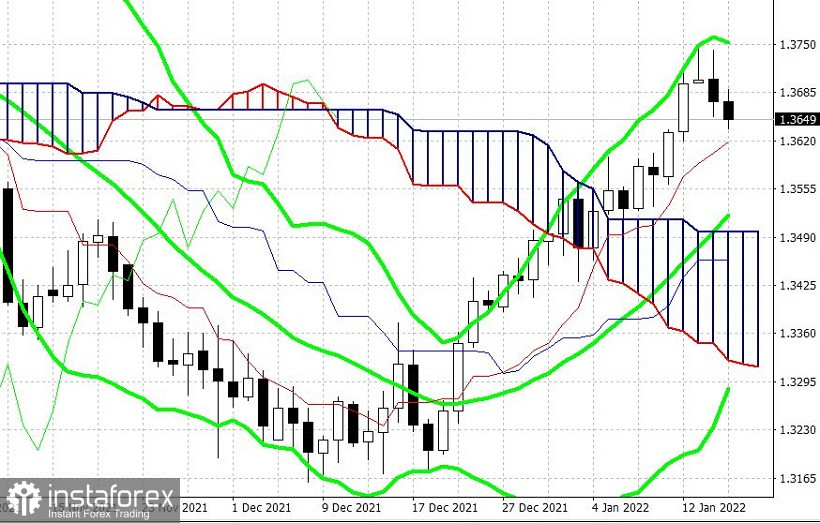The pound paired with the dollar did not stay within the 37th figure. In the wake of the general weakening of the greenback, last week the GBP/USD pair updated the 2.5-month price high (1.3748), but then retreated 100 points down. The downward trend was caused not only by the revaluation of the US dollar, but also by the devaluation of the pound. The British currency has ignored the political scandal that is breaking out in the UK for a long time. The so-called "Partygate" has shaken Boris Johnson's position as prime minister quite a lot. In the end, the scandal reached the foreign exchange market. Experts are seriously talking about the decline of Johnson's career: many doubt that he will be able to stay in the prime minister's chair this time. The political crisis is putting background pressure on the British currency. This pressure may increase significantly if key macroeconomic reports in the UK come out in the red zone this week.
But let's start with the details of the political scandal. Boris Johnson is being accused of partying at the London government house during last year's (most severe) lockdown without complying with quarantine measures. In addition, a photo was published in one of the newspapers showing the prime minister participating in a Christmas quiz surrounded by colleagues. In response, Johnson stated that he considered it a working event. However, his opponents called such excuses "ridiculous." In addition, this is not the first example of violations of quarantine rules, which the head of the British government and his staff are accused of. It is noteworthy that Johnson is now being criticized not only by representatives of the opposition, but also by his supporters-party members. Even the newspapers loyal to him did not defend themselves: the head of the Cabinet of Ministers is under a barrage of criticism from all sides.

The Labor leader has already called on the prime minister to "act with dignity" and voluntarily resign. The scenario of forced resignation is also being discussed in the camp of the Conservative Party. According to British journalists, members of the House of Commons are currently thinking about the prospects of declaring a vote of no confidence in the head of government. To begin with, it is necessary to collect the signatures of 54 conservatives – in this case, the issue will be put to a vote in parliament. According to available information, almost 30 MPs have already voted "for" the implementation of this scenario.
Johnson himself, responding to calls for resignation, said that the parties should first of all wait for the results of the internal investigation, which is being conducted under the authority of the second permanent secretary in the Cabinet. Tentatively by the end of January, she will announce her verdict on Partygate: either the politician will be found guilty of violating the British Covid-19 protocols, or acquitted. This "verdict" will largely determine Johnson's political fate. In case of a negative verdict, he may indeed be declared a vote of no confidence, especially since the popularity of the current prime minister is rapidly diving down. This is eloquently evidenced by the latest opinion polls of the YouGov agency. 70% of respondents said they disapprove of the policies of Johnson and his Cabinet. Last summer, the number of British people who approved of his work and those who disapproved was about equal. It is obvious that the prospects of an aggravation of the political crisis are putting pressure on the pound.
It should also be noted that important macroeconomic reports on inflation and the labor market will be published in the UK this week, which may also affect the GBP/USD pair.
According to preliminary data, the general consumer price index (scheduled for release on Wednesday) will be released at the level of 0.3% (on a monthly basis), while in November the growth rate was 0.7%. In annual terms, the overall CPI should rise to 5.0% (in November - 5.1%). The main consumer price index (excluding volatile energy and food prices) should also slow down slightly in December, rising to 3.9% (in November – 4.0%). As for the data in the labor market (the release is scheduled for Tuesday), the unemployment rate is expected to decrease (to 4.1%), a reduction in the number of applications for unemployment benefits (-38,000) and a decrease in the level of average earnings (both taking into account bonuses and without this component). If the aforementioned macroeconomic reports are in the red zone, the British currency will be under additional pressure.

Thus, the pound is currently unable to oppose itself to the greenback, which strengthened its position at the end of last week. The so-called "Partygate", the prospects of aggravating the political crisis, unresolved problems related to the echoes of Brexit (the issue of the Northern Ireland protocol, the "fish" issue) and the possible slowdown in the main macroeconomic indicators do not allow GBP/USD bulls to resume the upward trend. Short positions can be considered while aiming for 1.3610 (the Tenkan-sen line on the D1 timeframe). The next support level is located much lower, at 1.3500 (the upper limit of the Kumo cloud, coinciding with the middle line of the Bollinger Bands indicator on the same timeframe).
 English
English 
 Русский
Русский Bahasa Indonesia
Bahasa Indonesia Bahasa Malay
Bahasa Malay ไทย
ไทย Español
Español Deutsch
Deutsch Български
Български Français
Français Tiếng Việt
Tiếng Việt 中文
中文 বাংলা
বাংলা हिन्दी
हिन्दी Čeština
Čeština Українська
Українська Română
Română

